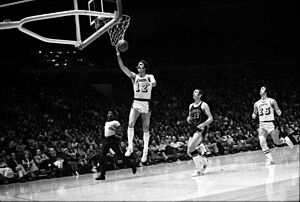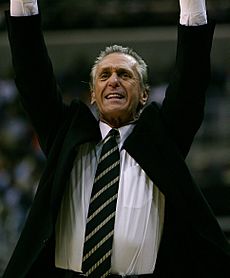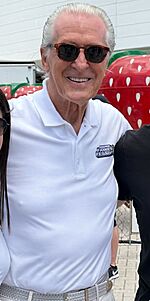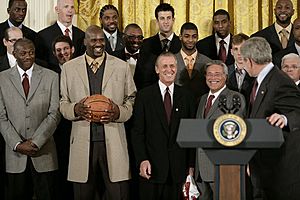Pat Riley facts for kids
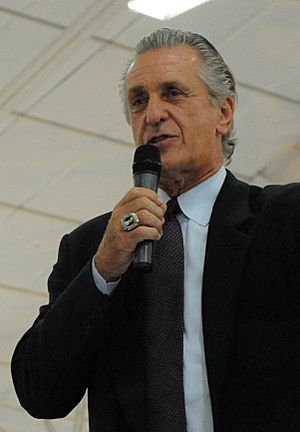
Riley in 2010
|
|
| Miami Heat | |
|---|---|
| President | |
| Personal information | |
| Born | March 20, 1945 Rome, New York, U.S. |
| High school | Linton (Schenectady, New York) |
| Listed height | 6 ft 4 in (1.93 m) |
| Listed weight | 205 lb (93 kg) |
| Career information | |
| College | Kentucky (1964–1967) |
| NBA Draft | 1967 / Round: 1 / Pick: 7th overall |
| Selected by the San Diego Rockets | |
| Pro career | 1967–1976 |
| Coaching career | 1979–2008 |
| League | NBA |
| Career history | |
| As player: | |
| 1967–1970 | San Diego Rockets |
| 1970–1975 | Los Angeles Lakers |
| 1975–1976 | Phoenix Suns |
| As coach: | |
| 1979–1981 | Los Angeles Lakers (assistant) |
| 1981–1990 | Los Angeles Lakers |
| 1991–1995 | New York Knicks |
| 1995–2003, 2005–2008 |
Miami Heat |
| Career highlights and awards | |
As player:
As head coach:
As assistant coach:
As executive:
|
|
| Career NBA statistics | |
| Points | 3,906 (7.4 ppg) |
| Rebounds | 855 (1.6 rpg) |
| Assists | 913 (1.7 apg) |
Patrick James Riley (born March 20, 1945) is a famous American basketball figure. He has been a player, coach, and executive in the National Basketball Association (NBA). Since 1995, he has been the team president of the Miami Heat. He also coached the Heat from 1995 to 2003 and again from 2005 to 2008.
Many people call Riley "the Godfather" because he is one of the greatest NBA leaders ever. He has won five NBA championships as a head coach. Four of these were with the Los Angeles Lakers in the 1980s, and one was with the Heat in 2006. Riley has won nine NBA championships in total. He won as a player (1972), an assistant coach (1980), a head coach (1982, 1985, 1987, 1988, 2006), and an executive (2012, 2013).
He is the first person in North American sports to win a championship in all four roles. Since he started his NBA career, Riley has been part of 19 NBA Finals. This means he has been in 25% of all NBA Finals as a player, coach, or executive. He was named NBA Coach of the Year three times. In 2008, Riley was added to the Naismith Memorial Basketball Hall of Fame as a coach.
Contents
Early Life and College Basketball
Pat Riley was born in Rome, New York, and grew up in Schenectady, New York. His father, Leon Riley, played baseball for many years. Pat played basketball for Linton High School in Schenectady. One famous game was against Power Memorial, which featured Lew Alcindor (later known as Kareem Abdul-Jabbar). Riley later coached Abdul-Jabbar with the Los Angeles Lakers.
Riley played college basketball for the Kentucky Wildcats. In 1966, he helped lead his team to the NCAA title game. They lost to Texas Western, a game shown in the movie Glory Road. Riley was named an All-American and SEC Player of the Year during his college career.
Playing in the NBA
Riley was picked by the San Diego Rockets in the 1967 NBA draft. He also got drafted by the Dallas Cowboys for football, even though he didn't play college football! After three seasons with the Rockets, he joined the Los Angeles Lakers.
Riley played five seasons for the Lakers. He was an important reserve player on the Lakers team that won the 1972 NBA Championship. This was his first NBA title. In 1975, he was traded to the Phoenix Suns. He retired from playing in 1976.
Coaching and Leading Teams
Los Angeles Lakers: The "Showtime" Era
Riley returned to the NBA in 1977 as a broadcaster for the Lakers. In 1979, he became an assistant coach. With star players like Magic Johnson and Kareem Abdul-Jabbar, the Lakers won the 1980 NBA Finals. This gave Riley his first championship ring as a coach.
In 1981, Riley became the head coach of the Lakers. He led the team during their famous "Showtime" era. This was known for fast-paced, exciting basketball. Riley became famous for his stylish suits and slicked-back hair. He was one of the first coaches to use a special defense called a 1-3-1 half-court trap. He always stressed the importance of getting rebounds, saying "no rebounds, no rings."
Riley led the Lakers to four straight NBA Finals. He won his first title as head coach in 1982. The Lakers won again in 1985, beating the Boston Celtics. In 1987, Riley coached one of the best teams ever, with Hall of Famers Magic Johnson, James Worthy, and Kareem Abdul-Jabbar. They won the championship, giving Riley his third title.
Riley famously promised the crowd that the Lakers would win again in 1988. And they did! They became the first team in 19 years to win back-to-back championships. Riley even trademarked the word "three-peat" for trying to win three in a row. However, injuries to key players like Byron Scott and Magic Johnson stopped the Lakers from winning a third straight title in 1989. Riley stepped down as Lakers coach in 1990.
New York Knicks: A Tough Team
After a year as a TV commentator, Riley became the head coach of the New York Knicks in 1991. He changed their style to be more physical and defensive. The Knicks had a big rivalry with the Chicago Bulls, led by Michael Jordan and Scottie Pippen. Riley's Knicks pushed the Bulls to seven games in the 1992 playoffs.
In 1993, Riley led the Knicks to one of their best regular seasons ever. He won his second Coach of the Year award. The Knicks reached the NBA Finals in 1994 but lost in seven games to the Houston Rockets. Riley became the first coach to be in a Game 7 of the NBA Finals with two different teams.
Miami Heat: Building a Champion
In 1995, Riley became the president and head coach of the Miami Heat. He had full control over the team's basketball decisions. He quickly improved the team, bringing in important players like Alonzo Mourning and Tim Hardaway. In 1997, the Heat beat Riley's old team, the Knicks, in a tough playoff series. The Heat reached the Eastern Conference finals for the first time. Riley won his third Coach of the Year award that season.
After a few challenging seasons, Riley stepped down as coach in 2003 but stayed as president. The Heat drafted Dwyane Wade and then traded for superstar center Shaquille O'Neal. In 2005, the Heat reached the Eastern Conference finals.
In 2005, Riley returned to coaching the Heat. He led them to the 2006 NBA Finals against the Dallas Mavericks. Even after losing the first two games, the Heat came back to win four straight games and their first NBA championship! This was Riley's fifth championship as a head coach.
After the 2007-2008 season, Riley decided to focus only on being the team president. He named Erik Spoelstra as the new head coach.
Miami Heat: Executive Success
As team president, Riley continued to build strong teams. In 2010, he helped bring LeBron James and Chris Bosh to join Dwyane Wade. This group became known as the "Big Three." Riley was named NBA Executive of the Year in 2011. The Heat reached the NBA Finals for four years in a row. They won championships in 2012 and 2013. These were Riley's first championships purely as an executive.
In the 2019-2020 season, the Heat made it to the NBA Finals again, even though they were not expected to. Riley had traded for Jimmy Butler and drafted Tyler Herro. They lost to the Los Angeles Lakers in six games. In 2023, the Heat made another surprising run to the Finals as an 8th-seeded team. They were the second 8th seed ever to reach the Finals. The Heat lost to the Denver Nuggets in five games.
In 2024, the Heat honored Riley by naming their home court the "Pat Riley Court at Kaseya Center."
Outside Basketball
Pat Riley is also known for his style, often wearing fancy suits. His nickname "The Godfather" comes from his appearance.
He has written two best-selling books. In his first book, Showtime: Inside the Lakers' Breakthrough Season, he talked about the "Disease of More." This idea means that after winning, players might want more for themselves, which can hurt the team. His second book, The Winner Within: A Life Plan for Team Players, shares lessons about teamwork and leadership.
Riley has been married to Christine Rodstrom since 1970. They have two adopted children, James Patrick and Elisabeth. He is a Roman Catholic. In 2007, he presented a jersey to President George W. Bush when the Miami Heat visited the White House.
Career Statistics
NBA
Regular season
| Year | Team | GP | GS | MPG | FG% | 3P% | FT% | RPG | APG | SPG | BPG | PPG |
|---|---|---|---|---|---|---|---|---|---|---|---|---|
| 1967–68 | San Diego | 80 | — | 15.8 | .379 | — | .634 | 2.2 | 1.7 | — | — | 7.9 |
| 1968–69 | San Diego | 56 | — | 18.3 | .406 | — | .672 | 2.0 | 2.4 | — | — | 8.8 |
| 1969–70 | San Diego | 36 | — | 13.2 | .417 | — | .727 | 1.6 | 2.4 | — | — | 5.3 |
| 1970–71 | L.A. Lakers | 54 | — | 9.4 | .413 | — | .644 | 1.0 | 1.3 | — | — | 4.9 |
| 1971–72 |
L.A. Lakers | 67 | — | 13.8 | .447 | — | .743 | 1.9 | 1.1 | — | — | 6.7 |
| 1972–73 | L.A. Lakers | 55 | — | 14.6 | .428 | — | .793 | 1.2 | 1.5 | — | — | 7.3 |
| 1973–74 | L.A. Lakers | 72 | — | 18.9 | .430 | — | .764 | 1.8 | 2.1 | .8 | .0 | 9.5 |
| 1974–75 | L.A. Lakers | 46 | — | 22.1 | .419 | — | .742 | 1.8 | 2.6 | .8 | .1 | 11.0 |
| 1975–76 | L.A. Lakers | 2 | — | 11.5 | .385 | — | .333 | 1.5 | .0 | .5 | .5 | 5.5 |
| 1975–76 | Phoenix | 60 | — | 13.2 | .389 | — | .730 | .8 | 1.0 | .4 | .1 | 4.6 |
| Career | 528 | — | 15.5 | .414 | — | .705 | 1.6 | 1.7 | .6 | .1 | 7.4 | |
Playoffs
| Year | Team | GP | GS | MPG | FG% | 3P% | FT% | RPG | APG | SPG | BPG | PPG |
|---|---|---|---|---|---|---|---|---|---|---|---|---|
| 1969 | San Diego | 5 | — | 15.2 | .432 | — | .833 | 2.2 | .4 | — | — | 7.4 |
| 1971 | L.A. Lakers | 7 | — | 19.3 | .420 | — | .727 | 2.1 | 2.0 | — | — | 9.4 |
| 1972 |
L.A. Lakers | 15 | — | 16.3 | .333 | — | .750 | 1.9 | .9 | — | — | 5.2 |
| 1973 | L.A. Lakers | 7 | — | 7.6 | .333 | — | — | .7 | 1.0 | — | — | 2.6 |
| 1974 | L.A. Lakers | 5 | — | 21.2 | .360 | — | .750 | 1.2 | 2.0 | .8 | .0 | 7.8 |
| 1976 | Phoenix | 5 | — | 5.4 | .400 | — | 1.000 | .0 | 1.0 | .0 | .0 | 2.6 |
| Career | 44 | — | 14.6 | .374 | — | .763 | 1.5 | 1.2 | .4 | .0 | 5.7 | |
Head Coaching Record
| Regular season | G | Games coached | W | Games won | L | Games lost | W–L % | Win–loss % |
| Playoffs | PG | Playoff games | PW | Playoff wins | PL | Playoff losses | PW–L % | Playoff win–loss % |
| Team | Year | G | W | L | W–L% | Finish | PG | PW | PL | PW–L% | Result |
|---|---|---|---|---|---|---|---|---|---|---|---|
| L.A. Lakers | 1981–82 | 71 | 50 | 21 | .704 | 1st in Pacific | 14 | 12 | 2 | .857 | Won NBA Championship |
| L.A. Lakers | 1982–83 | 82 | 58 | 24 | .707 | 1st in Pacific | 15 | 8 | 7 | .533 | Lost in NBA Finals |
| L.A. Lakers | 1983–84 | 82 | 54 | 28 | .659 | 1st in Pacific | 21 | 14 | 7 | .667 | Lost in NBA Finals |
| L.A. Lakers | 1984–85 | 82 | 62 | 20 | .756 | 1st in Pacific | 19 | 15 | 4 | .789 | Won NBA Championship |
| L.A. Lakers | 1985–86 | 82 | 62 | 20 | .756 | 1st in Pacific | 14 | 8 | 6 | .571 | Lost in Conference finals |
| L.A. Lakers | 1986–87 | 82 | 65 | 17 | .793 | 1st in Pacific | 18 | 15 | 3 | .833 | Won NBA Championship |
| L.A. Lakers | 1987–88 | 82 | 62 | 20 | .756 | 1st in Pacific | 25 | 15 | 9 | .625 | Won NBA Championship |
| L.A. Lakers | 1988–89 | 82 | 57 | 25 | .695 | 1st in Pacific | 15 | 11 | 4 | .733 | Lost in NBA Finals |
| L.A. Lakers | 1989–90 | 82 | 63 | 19 | .768 | 1st in Pacific | 9 | 4 | 5 | .444 | Lost in Conference semifinals |
| New York | 1991–92 | 82 | 51 | 31 | .622 | 1st in Atlantic | 12 | 6 | 6 | .500 | Lost in Conference semifinals |
| New York | 1992–93 | 82 | 60 | 22 | .732 | 1st in Atlantic | 15 | 9 | 6 | .600 | Lost in Conference finals |
| New York | 1993–94 | 82 | 57 | 25 | .695 | 1st in Atlantic | 25 | 14 | 11 | .560 | Lost in NBA Finals |
| New York | 1994–95 | 82 | 55 | 27 | .671 | 2nd in Atlantic | 11 | 6 | 5 | .545 | Lost in Conference semifinals |
| Miami | 1995–96 | 82 | 42 | 40 | .512 | 3rd in Atlantic | 3 | 0 | 3 | .000 | Lost in First round |
| Miami | 1996–97 | 82 | 61 | 21 | .744 | 1st in Atlantic | 17 | 8 | 9 | .471 | Lost in Conference finals |
| Miami | 1997–98 | 82 | 55 | 27 | .671 | 1st in Atlantic | 5 | 2 | 3 | .400 | Lost in First round |
| Miami | 1998–99 | 50 | 33 | 17 | .660 | 1st in Atlantic | 5 | 2 | 3 | .400 | Lost in First round |
| Miami | 1999–00 | 82 | 52 | 30 | .634 | 1st in Atlantic | 10 | 6 | 4 | .600 | Lost in Conference semifinals |
| Miami | 2000–01 | 82 | 50 | 32 | .610 | 2nd in Atlantic | 3 | 0 | 3 | .000 | Lost in First round |
| Miami | 2001–02 | 82 | 36 | 46 | .439 | 6th in Atlantic | — | — | — | — | Missed playoffs |
| Miami | 2002–03 | 82 | 25 | 57 | .305 | 7th in Atlantic | — | — | — | — | Missed playoffs |
| Miami | 2005–06 | 61 | 41 | 20 | .672 | 1st in Southeast | 23 | 16 | 7 | .696 | Won NBA Championship |
| Miami | 2006–07 | 82 | 44 | 38 | .537 | 1st in Southeast | 4 | 0 | 4 | .000 | Lost in First round |
| Miami | 2007–08 | 82 | 15 | 67 | .183 | 5th in Southeast | — | — | — | — | Missed playoffs |
| Career | 1,904 | 1,210 | 694 | .636 | 282 | 171 | 111 | .606 | |||
Awards and Honors
NBA
- Nine-time NBA Champion (one as a player, one as an assistant coach, five as a head coach, and two as an executive)
- Three-time NBA Coach of the Year
- Nine-time NBA All-Star Game head coach
- 2011 NBA Executive of the Year
- 2012 Chuck Daly Lifetime Achievement Award
NCAA
- 1966 First Team All-American
- Number 42 retired by the Kentucky Wildcats
Halls of Fame
- Naismith Memorial Basketball Hall of Fame (class of 2008)
See also
 In Spanish: Pat Riley para niños
In Spanish: Pat Riley para niños
- Pat Riley Basketball, a 1990 video game
- List of NBA championship head coaches
 | Isaac Myers |
 | D. Hamilton Jackson |
 | A. Philip Randolph |


